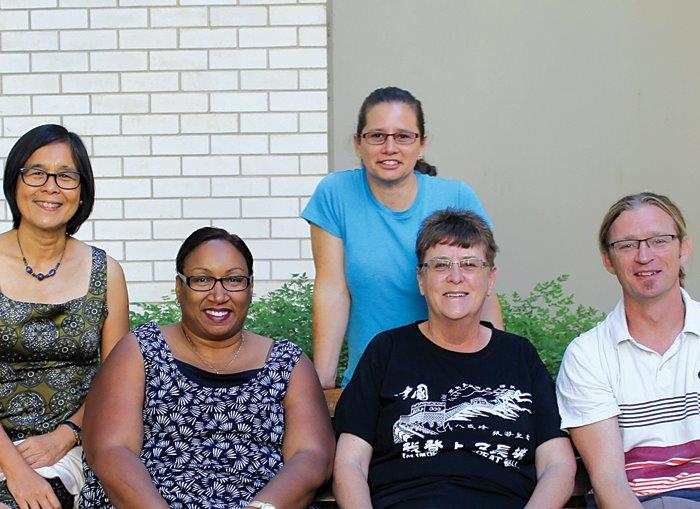While kangaroo tails are cooked and smoke billows above an inner city church courtyard on a balmy summer’s evening, stories are told by indigenous people. During morning worship, chairs are stacked in a haphazard pile to express sorrow over injustices experienced by the marginalized. Encouragement is given through Biblical stories of women and men who show their faith in Christ by listening, serving and forming new worshipping communities.
These are a few examples of the diverse and enriching experiences of the Deacon Intensive (for candidates) and the national DUCA (Diakonia in the Uniting Church in Australia) Conference that was held in February in Adelaide over two weeks.
The candidates were a diverse group, including two indigenous leaders, an Irish pastor, a Filipino journalist and an African-American woman, as well as several Australians, all with long experience of diaconal ministry. The candidates in the first week participated in worship, Bible studies, discussions, and immersion visits to a prison, refugee place of welcome and a community garden. Evening sessions, facilitated by Rev Dr Steve Taylor, Principal of Uniting College and Senior Lecturer at Flinders University, further extended their engagement with mission and community service.
During the second week, they were joined by 35 deacons from diverse settings around Australia. After a traditional Welcome to Country by Dr Alitja Rigney, the president of the Uniting Church in Australia, Rev Prof Andrew Dutney, gave an opening address which was a catalyst for conversation about the current reality and future possibilities in the Uniting Church. During the week speakers shared their experience of working with marginalized communities and field visits were made to places where Deacons are pioneering new ministry with the mentally ill, the poor and migrant communities. Being based at Pilgrim Church in central Adelaide, participants had opportunity to join in the life of an inner city church, sharing in Pancake Day, an Amnesty International Vigil and an Ash Wednesday service.
Five West Australians attended these events and here three of them share their responses.
Bev Fabb
25 years ago I was part of the movement to renew the diaconate in the Uniting Church. The vision at that time was that deacons would lead the church into new forms of ministry and mission in response to rapid changes in Australian society. What excited me about this gathering was hearing how this vision is being fulfilled. All over Australia deacons are pioneering new ministries, developing new faith communities, leading fresh expressions of the church, exploring new ways of worship, usually with people who previously have had no previous experience of church.
What was even more exciting was to hear of ministers of the Word and lay people who are also grabbing hold of this vision and incorporating diaconal aspects into their ministry. It was never intended that deacons would be the only ones doing diaconal ministry- rather that they would lead, inspire, encourage and equip others for this style of ministry. And it is clear that they are doing just this! I felt incredibly thankful to God to see the fruits of the renewal movement I was part of long ago.
Andrew Broadbent
As a deacon going into my first placement the highlight of the conference for me was simply meeting others who had “walked the path” before me. It was encouraging, inspiring and challenging all at the same time as I listened to various people share their stories. I came away with lots of ideas about what to do and a few pointers around what not to do also!
Sophia Lizares
I was talking in exclamation points all those two weeks: Enriching and encouraging! So affirming of the calling to serve as Deacon! I encountered not just individuals, but an international community that shared a passion for distinctive pioneering work among the whole people of God.
The candid conversations with deacons in a wide range of settings pointed to many professional and personal possibilities and challenges. New tools of the trade were presented. Although they seemed like participatory research and planning methods, the main difference was the emphasis on hospitality.
With each of the candidates having solid previous work experience, the use of adult education methods “you’re the driver” was much appreciated. I realised over and over that a large part of the work in formation entails a shift in perspective, shaping your identity and vision as an ordained minister. Underscored was the importance of “relationships before stories before questions”, an approach so counter-intuitive for me, a journalist and social researcher in a previous life.
Having Denise Champion and Maratja Dhamarrandji, two deacon candidates from Congress, among the participants provided us greater exposure to the faith-life of Aboriginal Australians. The WA candidates were fortunate to have led worship on 13 February, the anniversary of the Apology to the Stolen Generations. This and my going with Denise on an Adnyamathanha Pilgrimage to Wilpena Pound will remain with me forever.
I was so touched by the hospitality of the South Australian deacons and candidates who hosted us, opened their homes, offered us rides home even though they were worn out after many 14-hour days, juggling not just work at the intensive, but also local church and family responsibilities. Many, many thanks to you!
For more information go to the DUCA website: www.diakonia.uniting.com.au
Image: WA attendees of the Deacon Intensive and DUCA Conference in South Australia. l-r: Sophia Lizares, Judy Sanderson, Rev Denise Savage, Rev Bev Fabb and Rev Andrew Broadbent.
